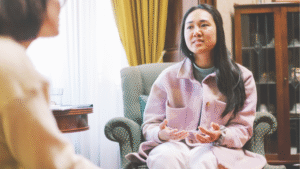The main characteristic of emotional maturity is the ability to see life clearly and accurately and to be able to deal with life’s ups and downs in a healthy way. Emotionally mature people are able to control their emotions and take full responsibility for their life and actions along with being able to handle their anger, resentments, insecurities, disappointments, fears, jealousies, guilt, and a lot of other emotions including grief.
The Emotionally Immature
Those who are emotionally immature are unable to get past their negative emotions act and react to their feelings and can’t make sense of situations or defend themselves in an appropriate way.
Those who are emotionally immature may have been discouraged by their parents to talk about feelings, seek help and support, deal with conflicts and problems and if they may have not been allowed to express feelings of anger and sadness.
Relationships with emotionally immature people are said to be often strained and difficult to maintain as these people unable to interpret and respond to life’s challenges in an appropriate way.
Studies have found that the struggles we human beings face often come from within us. Our experiences and traumas along combined with our coping mechanisms can determine the success or failure we’ll have in overcoming anxiety and depression
Becoming Emotionally Mature
Becoming emotionally mature will mean learning new methods of coping with stressful situations. Quite often stressful situations can induce a lack of sleep, conflicts, anxiety, anger, grief and pain that often stems from our childhood emotional neglect. Emotionally mature people quite often deal with life’s stressful situations more effectively.
Research offers a deeper insight and understanding as to how we as humans can learn to live happier and healthier lives.
In recent studies of the majority of adults tested, it was found that traumatic life events were the biggest factor to cause both conditions. The study also found that their individual coping styles were significantly responsible for their depression and anxiety equalling that of the traumatic life events.
3 coping flaws identified as major contributors
1. Rumination – Being fixated and focussed on negative thoughts, beliefs and feelings.
2. Lack of adaptive coping – Failing to look after the self by not eating well and exercising, lack of communication to friends or family for support and an inability to foresee stressful events.
3. Self-blame – people with emotional neglect often turns things back on themselves.
Focusing On The Right Things Can Help
Avoid dwelling on the negative aspects and seek support when required. Eating healthy and exercising can assist mental health and self-acceptance rather than blame is a key factor to a successful outcome. Those who focused on something that is important and meaningful to them, like core values or family were more receptive to acting on suggestions of taking up regular exercise in the month to come. Brain scans showed that the vendomedial prefrontal cortex was activated with the meaningful thoughts.
Test results on 200 people showed that the most positive and healthy emotion was awe, and also determined that those with the lowest levels of cytokines had the highest levels of positive emotions.
Sources
Psych Central – 3 New Psychology Research Findings You Should Know About
Heart Mind & Spirit – Relationships With Emotionally Immature People








Have you thought about becoming a qualified counsellor? It’s a great opportunity to learn how you can extend God's love and grace to the hurting out in the community.
For those who would like to enrol in aifc’s accredited Christian counselling courses we have two intakes per year for courses commencing around the following months:
Enrolment Season - opens approximately 2 months prior to our courses commencing. Enrol online here during our enrolment season.
We also offer two modes of study:
A Master of Counselling course was introduced in 2018.